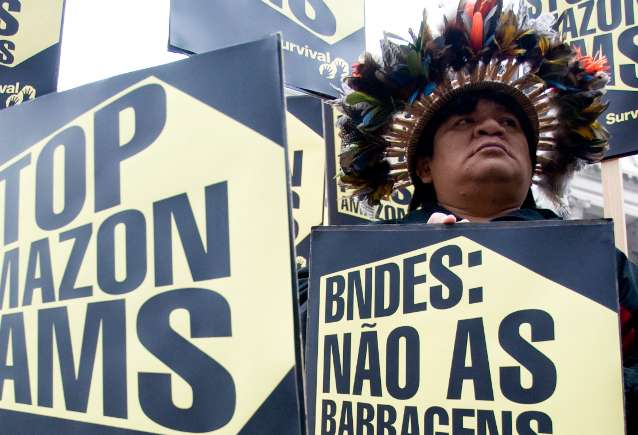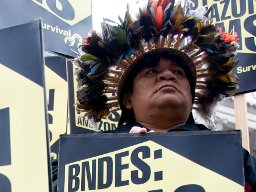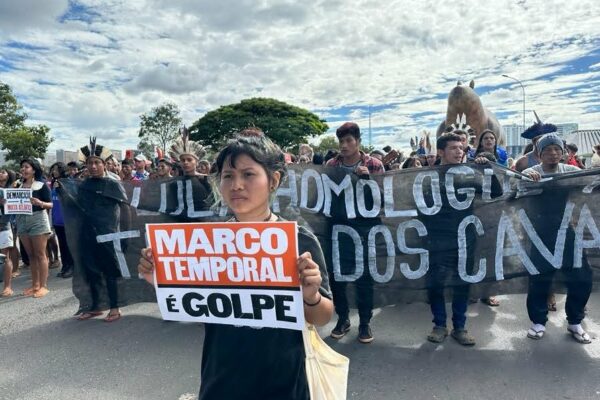
My people and I are sworn to death.Chief Almir Surui
Sign the Petition!
To protest the Forest Code and the gutting of Brazil’s rainforest protection laws, sign the Avaaz petition here.
Almir Narayamoga Surui, tribal chief of the Surui people from Western Rondonia in the Brazilian Amazon and internationally-recognized indigenous rights defender who participated in an indigenous delegation to Europe last March with Amazon Watch and our allies to expose the destructive lending practices of the Brazilian National Development Bank (BNDES), is once again at high risk as he works to defend the ancestral territory of the Surui people in Brazil’s Amazon rainforest. It is the same threat looming over many indigenous leaders, rural agriculturalists and environmental activists who oppose destructive development, such as illegal logging and ranching, in the Amazon. One difference in this case, however, is that Chief Almir has traveled the world and has over 3,000 friends on Facebook where he’s posted his concerns in an open letter (see below).
“My people are sworn to death,” said Almir, who recently traveled to Brasilia along with 11 other threatened Paite/Surui indigenous leaders to request protection from the National Secretary of Human Rights (SDH) and the Ministry of the Environment. Despite the urgency of the situation, the Secretary of Human Rights is still “analyzing” Almir’s case. For years, Almir has voiced his security concerns to the Brazilian government, including the National Secretary of Human Rights and FUNAI, but no one has delivered the protection Almir urgently needs. In 2007, he asked the OAS for support, but very little was done by the Secretary of Human Rights in response.
Based on Socioambiental’s recent interview with Almir, the chief is not optimistic. “My death is commissioned, somewhere in the forest, someone is planning my ambush. I am just waiting for a more favorable scenario.” Almir claims the death threats have been coming for a long time, but have particularly intensified in the last month after the Brazilian Chamber of Deputies “retrograded” the Forest Code allowing more logging and destructive development of Brazil’s remaining forests.
With the final licensing of the Belo Monte Dam on June 1st and the Brazilian Chamber of Deputies’ approval of changes to the Brazilian Forest Code on May 25, tensions are higher than ever. According to Almir, threats stem from the fact that most indigenous leaders are opposing the approval of the Forest Code. Similarly, those in opposition to the Belo Monte Dam Complex on the Xingu River in Pará are also those receiving the most threats. According to International Cry, “Intimidation is being used, including against communities, but in the most vehement manner against indigenous leaders at the head of the movement in opposition to construction of the hydroelectric dam”.
Concerns over security are growing, according to the Indigenist Missionary Council’s (CIMI) Report on Violence against Indigenous Peoples in Brazil – 60 Indigenous people were killed and another 152 received death threats in 2010 alone. In addition, CIMI recorded 92 cases of violence against indigenous property, as well as many other occurrences. Threats and murders are not exclusively directed at indigenous leaders. Many targets include community members, rural workers, social movement leaders and activists. As recently reported by Jon Lee Anderson in The New Yorker, the environmental activist José Cláudio Ribeiro da Silva was killed by loggers on the eve of the Forestry Code vote. Three days later, activist Adelino Ramos was shot dead in front of his wife and children. The next day, Eremilton Pereira dos Santos was gunned down, allegedly for witnessing Ribeiro’s killing. All this happened within one week. According the Pastoral Land Commission (CPT), six rural workers have been killed in northern Brazil since May.
The Pastoral Land Commission (CPT), a Catholic agency that tracks rural violence in Brazil has given the federal authorities a list of more than 1,800 people in the Amazon who have received credible death threats over land disputes since 2001. These numbers by no means include all the offences that actually happened. Many killings, threats and occurrences of violence against indigenous people and activists go unreported.
More than 1,000 environmental activists, religious workers, organizers and rural workers have been killed in the Amazon in the last 20 years. The Brazilian government has pledged to boost the presence of federal law enforcement in the region while also promising to open several offices to resolve the land disputes behind the violence. In early June this year, President Dilma Rousseff sent an army of officers and federal police to the Amazon region to control the rising violence. Locals are skeptic however, lawlessness and violence rules in a region where the Brazilian state has little to no control. The CPT argues that increasing security is not the answer. Instead, investigating crimes and punishing those found guilty should happen immediately. We agree, as Amazon Watch’s DC Advocacy Coordinator, Andrew Miller, shared recently with Al Jazeera.
Amazon Watch has been in touch with Chief Almir and his allies in around the world to come together in defense of Chief Almir and the Surui. We’ll keep you updated on our actions and let you know how to show your support. For now, please post a comment below, or better yet, send a comment to Chief Almir on Facebook. He’ll appreciate it.
For more information on the Surui Indigenous Reserve or Almir’s work to defend Surui life and culture, check out this video on the Surui Carbon Project.
Chief Almir’s Open Letter on Facebook, June 16, 2011:
Almir Surui seeks protection of the Secretariat of Human Rights
Chief Almir Surui Narayamoga met with Fernando Matos, the Director of the Department of Human Rights (SDH), of the Brazilian Government, on June 15th), in Brasilia to inform him of the constant threat against him and the Surui indigenous communities.
He requested the meeting to denounce the threats they have been suffering at the hands of loggers in the region.
The Surui live in the Sete de Setembro, located in the south-eastern state of Rondonia and north-western Mato Grosso. The region is part of a etnoambiental corridor, a protected areas and indigenous lands, at the deforestation frontier. An area targeted by loggers last week and again now.
The numbers of inducement, by loggers, to the Surui people have increased considerably, putting at risk the unity of the community, the protection of land and sustainability. In addition to the promises of easy money, they offer alcoholic beverages and seek to enter Indian territory by trying to engage with indigenous youth.
Chief Almir, has worked for years within the village to make people aware that the Surui are the greatest protectors of the land. “The return of loggers to the region only came to disrupt an entire work that was being done by our people. We must say no to deforestation. I am threatened, but confident that there is a collective consciousness among the indigenous communities,” says Chief Almir.
The threats to the Chief Almir have increased significantly due to his unwavering position against the deforestation of the region. He is committed to protect and guarantee the sustainability of the forest, and has gained global prominence in his struggle. In fact, the situation is not new. The indigenous community had already denounced the situation of insecurity to the Organization of American States (OAS) in 2007, and requested its inclusion in the Program for the Protection of Human Rights Defenders, the following year.
The very legal and political context in which the approval of the new Forest Code stands out, has triggered a process in which the maintenance of standing forest is threatened and, consequently, the lives of those who use it sustainably. Chief Almir Surui seeks guarantees to protect their physical integrity by the Brazilian Government to enable them to continue working in their land, implementing projects that provide subsistence and income generation without harming the environment.














